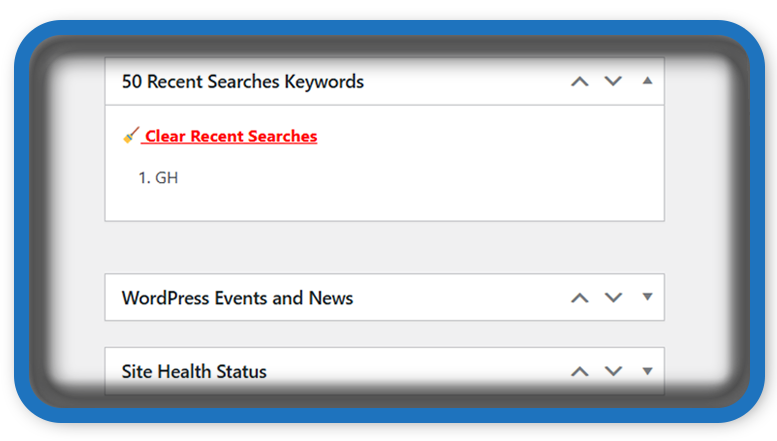⏲️ Estimated reading time: 4 min
📄 Learn how to create a custom dashboard panel in WordPress that displays the last 50 recent search keywords from your site visitors. Track user interest, improve SEO, and enhance your content strategy with this simple PHP tutorial.
📝 How to Create a Panel for Recent Search Keywords in the WordPress Dashboard
If you’re looking to improve your WordPress website’s content and SEO strategy, tracking what users are searching for is an essential step. Every term typed into your site’s search bar is a valuable clue into what your visitors want. Wouldn’t it be great if you could view those keywords directly from your WordPress admin dashboard?
In this guide, you’ll learn how to build a custom panel that shows the 50 most recent search keywords submitted by users on your site. This PHP-based method is lightweight, plugin-free, and perfect for developers or bloggers looking to gain insight into user behavior.
Why Track Recent Search Keywords?

Search queries reflect real-time user intent. Unlike analytics reports that may take time to interpret, displaying terms directly in your dashboard gives you immediate clarity on:
- What content users are struggling to find
- Potential topics you haven’t yet covered
- SEO opportunities based on demand
- How well your existing content matches user needs
Instead of guessing what users want, let their history guide your decisions.
Step-by-Step Guide: Build the Dashboard Panel
Let’s walk through how to add this search keyword tracking functionality to your WordPress site.
1. Track User Search Terms
Add the following code to your theme’s functions.php file or in a custom plugin to capture search queries.
function track_recent_search_queries() {
if (is_search() && !is_admin()) {
$search_term = trim(get_search_query());
if (!empty($search_term)) {
$recent_searches = get_option('recent_search_terms', []);
$recent_searches[] = $search_term;
if (count($recent_searches) > 50) {
$recent_searches = array_slice($recent_searches, -50);
}
update_option('recent_search_terms', $recent_searches);
}
}
}
add_action('template_redirect', 'track_recent_search_queries');
This stores each new search-keyword in a WordPress option and ensures only the latest 50 are saved to avoid performance issues.
2. Add the Dashboard Panel Widget
Now let’s create a dashboard widget titled “50 Recent Searches Keywords”.
function recent_search_terms_dashboard_widget() {
wp_add_dashboard_widget(
'recent_search_terms_widget',
'50 Recent Searches Keywords',
'display_recent_search_terms'
);
}
add_action('wp_dashboard_setup', 'recent_search_terms_dashboard_widget');
3. Display the Keywords and Add a “Clear” Link
Here’s how to display the keywords and provide a one-click reset button to clear the stored list.
function display_recent_search_terms() {
$recent_searches = get_option('recent_search_terms', []);
$clear_url = esc_url(add_query_arg('clear_recent_searches', '1', admin_url()));
echo '<p><a href="' . $clear_url . '" style="color:red; font-weight:bold;">🧹 Clear Recent Searches</a></p>';
if (!empty($recent_searches)) {
$recent_searches = array_reverse($recent_searches);
echo '<ol>';
foreach ($recent_searches as $term) {
echo '<li>' . esc_html($term) . '</li>';
}
echo '</ol>';
} else {
echo '<p>No recent search keywords found.</p>';
}
}
4. Enable Reset Functionality
To reset the list, allow access via a secure admin-only URL.
add_action('admin_init', function() {
if (isset($_GET['clear_recent_searches']) && current_user_can('manage_options')) {
delete_option('recent_search_terms');
wp_redirect(remove_query_arg('clear_recent_searches'));
exit;
}
});
Admins can now visit:https://your-site.com/wp-admin/?clear_recent_searches=1
to wipe the search log clean.
Download Updated Full PHP Code
Final Notes
This dashboard panel offers a real-time, code-only solution to better understand what your audience is actively looking for. It’s a smart way to identify content gaps, optimize your SEO, and ensure your site is aligned with what users truly need.
No external plugins. No bloat. Just pure insight.
📩 Do you have questions or suggestions? Leave a comment or contact us!
🏷️ Tags: WordPress dashboard, recent searches, search keyword tracking, user behavior, SEO tools, WordPress admin, PHP widget, WordPress functions, blog analytics, plugin-free
📢 Hashtags: #WordPressTips, #DashboardWidget, #SearchKeywords, #PHPTutorial, #SEOTracking, #TrackSearch, #ContentPlanning, #WPAdmin, #UserBehavior, #WordPressDev
Only logged-in users can submit reports.
Discover more from HelpZone
Subscribe to get the latest posts sent to your email.

